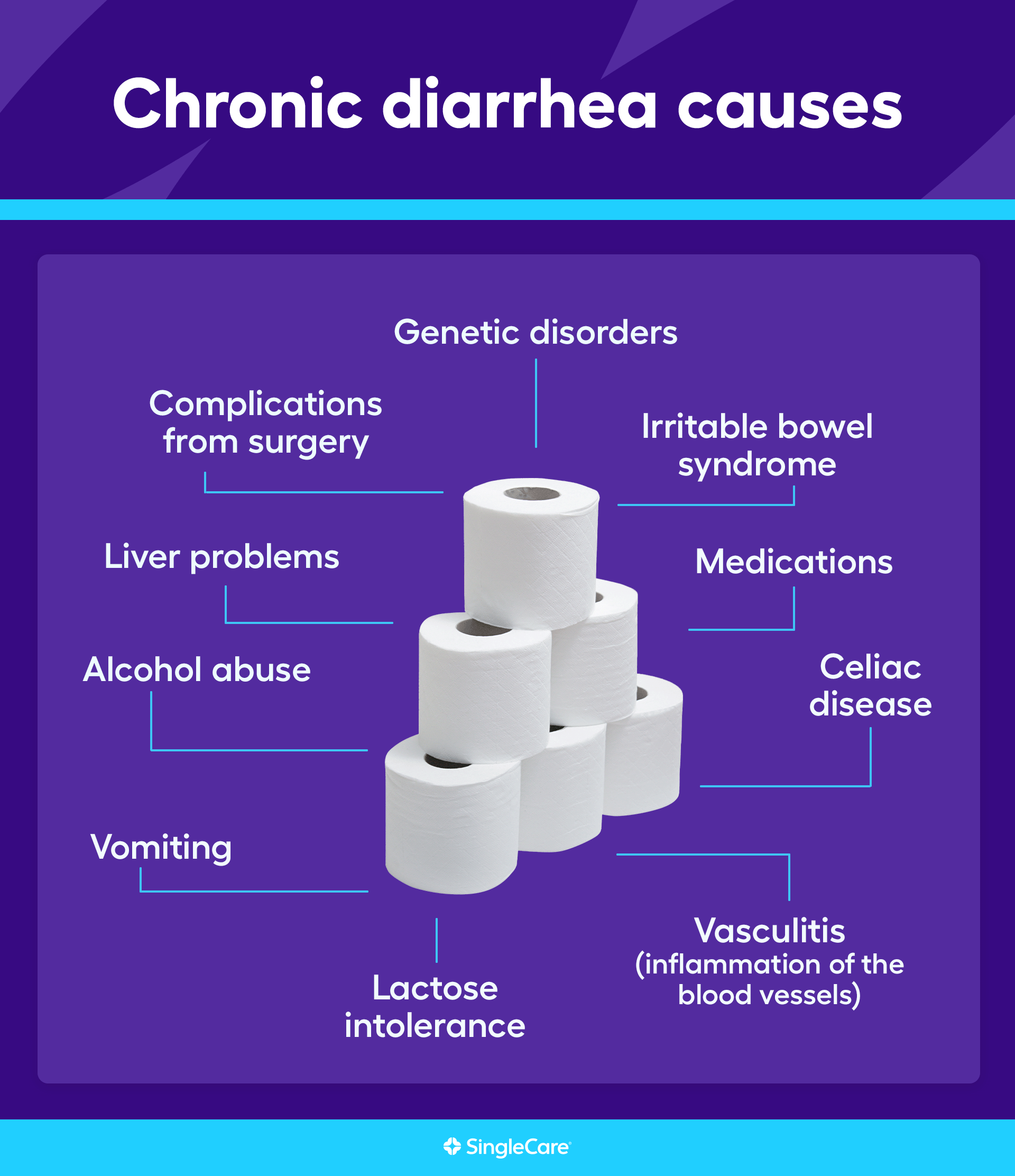Overview: What does chronic diarrhea look/feel like?
While everyone experiences a bout of diarrhea at some point, that bout of diarrhea may sometimes overstay its welcome. When diarrhea lasts for four weeks or longer, it’s then considered a case of chronic diarrhea. At that point, it is certainly a problem that needs to be taken seriously. On the one hand, it may be a sign of some serious medical condition. On the other hand, nonstop diarrhea can result in more serious complications like dehydration and malnutrition. Many people, though, use the word “diarrhea” to describe problems that aren’t technically true diarrhea, like bowel incontinence. Healthcare providers consider diarrhea to be loose or watery stools that occur at least three times a day. If genuine diarrhea persists for days or weeks, other symptoms are possible. Weight may go down, the body gets dehydrated, the abdomen may begin to hurt, and the rectum could start bleeding. The good news is that chronic diarrhea is treatable. However, it may take some diagnostic detective work to identify the underlying cause.
What causes chronic diarrhea?
Chronic diarrhea has many causes. In the United States, one of the most common causes of chronic diarrhea is irritable bowel syndrome (IBS). However, there are so many causes of chronic diarrhea it helps to group them by the type of diarrhea they cause.

Secretory diarrhea is watery diarrhea due to the intestinal lining secreting electrolytes into the bowel. This allows water to build up in the intestines, making stools loose and watery. The major causes are:
Impaired ability to absorb bile acid (bile acid diarrhea)
Hormone disorders such as hyperthyroidism or endocrine cancers
Microscopic colitis
Genetic disorders
Complications of surgery
Vasculitis (inflammation of the blood vessels)
Medications, especially bisacodyl laxatives
Alcohol abuse
Osmotic diarrhea is watery diarrhea due to the intestines not being able to digest and absorb a food product through the lining of the intestines. Again, this can dramatically increase the water content of stools. Causes of chronic osmotic diarrhea include:
Celiac disease
Lactose intolerance, fructose intolerance, or other problems absorbing carbohydrates
Medications, particularly magnesium-based or lactulose laxatives and antacids
Non-absorbable sugar alcohols such as sorbitol or mannitol. These are usually added as artificial sweeteners to food or liquid medications (“elixir” diarrhea)
Functional diarrhea is watery diarrhea caused by an overactive colon that speeds stools through the system too quickly. This rapid transit gives stools less chance to bulk up. Chronic functional diarrhea is mostly caused by:
Fatty diarrhea produces loose stools that are full of oils (steatorrhea). They are due to one of two problems. Either the intestines are unable to absorb foods (malabsorption), or other digestive organs aren’t working right (maldigestion). The most common causes are:
Finally, inflammatory diarrhea produces loose stools containing blood or pus. The most common causes are:
Should I be worried about chronic diarrhea?
If diarrhea doesn’t get better after two or three days, talk to a healthcare professional. It’s also time to see a doctor if there’s blood in the stools, unbearable abdominal pain, or weight loss. Two to three days doesn’t qualify as chronic diarrhea, but many people wait too long to see a healthcare professional. Talking to a healthcare professional early can help avoid complications such as dehydration, malnutrition, weight loss, anemia, electrolyte imbalance, kidney damage, or rectal bleeding,. Additionally, persistent diarrhea may be due to a more serious gastrointestinal issue, like immune system problems, cancer, or a bad infection.
In some cases, diarrhea will require immediate medical care. Go to an emergency room if there are signs of dehydration, such as excessive thirst, dark urine, infrequent urination, dry mouth, or dry eyes. Also, go to an emergency room if the diarrhea is accompanied by other serious symptoms such as a high fever or vomiting.
How is the cause of chronic diarrhea diagnosed?
Because there are so many potential causes of chronic diarrhea, a diagnosis will require a bit of detective work. The healthcare provider’s first goal is to make sure it’s diarrhea. Many people use the term loosely (no pun intended), so the healthcare provider will ask in detail what the stools are like. To meet the medical definition of diarrhea, bowel movements must involve loose stools at least three times a day.
If the problem is diarrhea, then the healthcare professional will need a thorough medical history to determine the cause. Be prepared to answer questions like:
When did the problem start?
How long has it lasted?
Are there any other symptoms?
What medications are you taking?
What do you eat?
What medical conditions do you have?
Have you been traveling? Where?
A physical examination will help the healthcare provider look for clues to determine the cause. Blood tests and stool tests are used to look for a variety of issues such as infections, electrolyte imbalances, metabolic functions, malnutrition, anemia, digestive enzyme problems, and blood or fats in the stools. If there are any warning signs of a more serious problem, a doctor may perform a sigmoidoscopy or colonoscopy to examine the inside of the colon. For some conditions that cause chronic diarrhea, the healthcare provider may need to remove a small tissue sample for a biopsy.
Is chronic diarrhea contagious?
Chronic diarrhea due to an infection (also called gastroenteritis) is usually contagious. The organisms or their spores can be spread from person to person through the ingestion of fecal matter. That sounds unappealing, but fecal material is easily spread to the mouth through unwashed hands, poorly prepared foods, and contaminated surfaces. In the United States, infections are the most common cause of chronic diarrhea in people with low incomes.
To prevent the spread of diarrheal infections:
Wash your hands frequently
Always wash your hands after using the bathroom or changing diapers
Wash your hands before handling food
If possible, wash food before preparation
Cook food thoroughly
If someone in the household has infectious diarrhea, wash surfaces regularly and don’t share utensils or towels
How long does chronic diarrhea last?
To be diagnosed as chronic diarrhea, loose stools occurring three or more times a day must persist for at least four weeks. That’s the minimum time that chronic diarrhea lasts, but it could go on for a year or more before getting better. In some cases, chronic diarrhea will last until the underlying problem is treated. Most people who see a healthcare professional will get rapid relief from diarrhea from antidiarrheal medications such as loperamide.
How to stop chronic diarrhea
If diarrhea persists for several days, treatment may be required to head off possible complications such as dehydration, malnutrition, and acute kidney injury.
How to get rid of chronic diarrhea? The doctor’s first order of business is to treat the underlying cause, such as with antibiotics for a bacterial infection (however, most bacterial infections of the intestines will resolve on their own), prescription colitis medications for inflammatory diarrhea, stopping medications that cause diarrhea, or taking dairy products out of the diet for people who are lactose intolerant. During treatment, people will be prescribed antidiarrheal medications to relieve the symptoms (although your doctor may hold off on these if you have an active infection).
If there is no cause identified, people are usually given medications to control diarrhea. The first-line treatments for chronic diarrhea are opioid derivatives , particularly loperamide, that slow down the colon’s activity, allowing stools time to bulk up. Other prescription drugs may be used to provide diarrhea relief, depending on the cause.
To address complications like dehydration, people should drink plenty of fluids until the diarrhea resolves. Supplements may need to be taken to address any nutritional deficiencies caused by persistent diarrhea.
RELATED: Why you should take probiotics with antibiotics
FAQs about the causes of chronic diarrhea
What infections cause prolonged diarrhea?
Food poisoning or intestinal infections that cause diarrhea usually resolve in a few days. Some may require treatment; others may not. However, several bacterial, viral, or parasitic infections of the intestines can persist for a long time, causing chronic diarrhea and even worse. The most common culprits are bacteria like C. difficile viruses like cytomegalovirus or herpes (mainly in those with weakened immune systems), and microscopic parasites like Giardia and amoebas (amoebic dysentery). These are not benign infections. They need treatment, so if diarrhea persists for several days or longer, it’s time to see a doctor.
What types of cancer cause constant diarrhea?
A number of cancers can disrupt the digestive system, including some types of colon cancer, hormone gland cancers, lymphomas, and a type of pancreatic cancer called vipoma. However, as a possible cause of diarrhea, these diagnoses would be further down on the list.
What are some common causes of diarrhea in older adults?
Older adults are vulnerable to the same problems that cause diarrhea as younger adults. One difference is that older adults take more prescription medications than younger people. Most people don’t know that more than 700 drugs are known to cause diarrhea as a side effect. These medications can add up quickly for older adults. Seniors are also more likely to take laxatives to help with constipation. That’s why healthcare providers always ask for a medication history when diagnosing chronic diarrhea.

